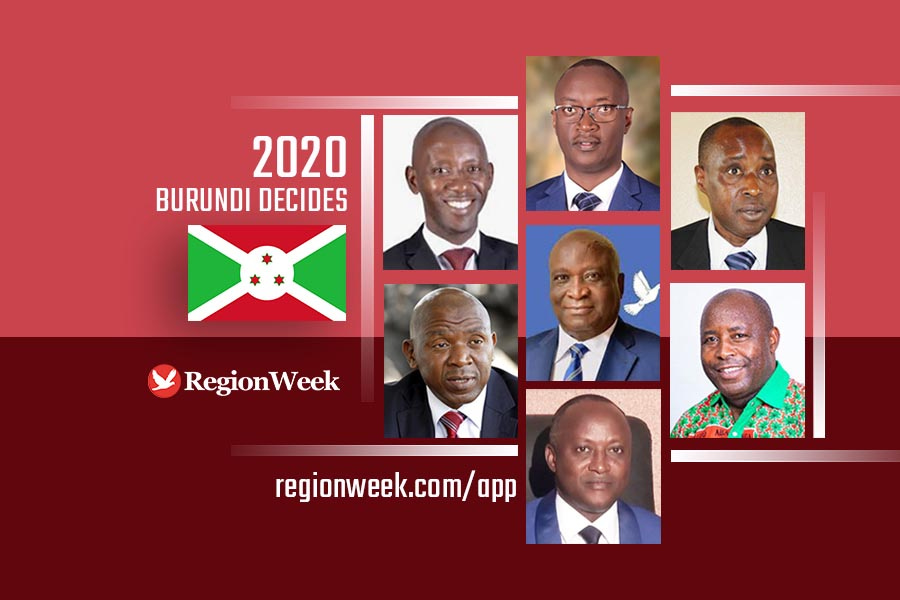Burundi: Campaigns Begin but the rights monitoring groups are once again worried
The Briefing Issue #80, Monday, April 27, 2020
This is the online version of RegionWeek for decision-makers and young professionals, a newsletter about depth and context to Burundi and East Africa stories— written by me, Fabrice Iranzi. You can sign up for your own subscription to get concise information about game-changing events and insights straight to your inbox:

Dear RegionWeek Reader,
This Monday, April 27, 2020, Burundi's political parties launched campaigns for next month's general elections to replace President Pierre Nkurunziza, who has been in power since 2005.
7 candidates are confirmed in the race, they are General-Major Evariste Ndayishimiye of the CNDD-FDD; CNL Agathon Rwasa; Domitien Ndayizeye of the political coalition KIRA Burundi; Léonce Ngendakumana from Sahwanya FRODEBU; Gaston Sindimwo of UPRONA and two independent candidates: Francis Rohero and Dieudonné Nahimana.
The ruling CNDD-FDD party's candidate, Major General Evariste Ndayishimiye, and Agathon Rwasa of the main opposition party, the National Congress for Liberty (CNL), are considered the front runners.
The Independent National Electoral Commission (CENI) organized a press briefing on Saturday, April 25, 2020, in Bujumbura to give directives for the electoral campaign.
The President of the CENI, Pierre Claver Kazihise indicated that only political parties, coalitions, and independents who have submitted their candidacies to the CENI are authorized to campaign while respecting non-violent communication.
He said the campaign opens at 6 am and ends at 6 pm and is done through speeches, read or sung messages, publicly proclaimed messages, posters, meetings, and through the press.
The rights monitoring group, Amnesty International, has released a report that warned about a crackdown on the opposition.
“Fleeing refugees consistently told us they had been harassed by the Imbonerakure youth because of their real or perceived opposition; they were under intense surveillance and were threatened when they did not attend meetings organized by the ruling party,” said Deprose Muchena, Amnesty International’s Director for East and Southern Africa.
“Political space in Burundi is extremely tense, and private institutions taking proactive preventive measures against COVID-19 have been threatened with sanctions. With so much at stake, respect for Burundians’ human rights should be front and center as critical decisions are made in this election period,” added Deprose Muchena.
Reacting to the statement, Willy Nyamitwe, President Pierre Nkurunziza’s Advisor tweeted:
The wickedness of @hrw has so far caused harm only to this accursed organization and its researchers (whining) in the pay of the West. Burundi has remained and will remain intact in their cursed gossip campaign.


In Burundi, the president is elected using the two-round system. If no candidate receives a majority of the vote in the first round, a second-round will be held.
100 members of the National Assembly are elected from 18 multi-member constituencies based on the provinces using the closed-list proportional representation system.
Seats are allocated using the D’Hondt method with a national 2% electoral threshold. A further three members of the Twa ethnic group are appointed, and more members are co-opted to ensure a 60-40 split between Hutus and Tutsis, and a 30% quota for female MPs.
Thanks for reading!
Fabrice Iranzi,
Editor, RegionWeek.com
If you wish to support this Newsletter we created a $5/Month subscription plan, you can join our Premium community of supporters by clicking here
IN THE REGION
COMESA
The COMESA Secretariat intends to mount a public awareness campaign on the benefits of the regional common investment area agreement in an effort to encourage countries to ratify and domesticate the regional document.
“The instrument will ensure the investment and investor’s protection and encourage the Member States to carry out reforms and liberalization by the opening of economic sectors for growth to all investors, particularly the ones originating from the region,” says Mr. Joseph Mpunga, Senior Investment Officer at COMESA Secretariat.
The COMESA Common Investment Area (CCIA) agreement is a promotional tool meant to guide the Member States in harmonizing best practices in investment and facilitating private sector development. Among the major programs envisaged is granting national treatment equally to COMESA investors and citizens of all Member States.
East African Community
The East African Court Justice (EACJ) through a video conference held an extraordinary Plenary for Judges and resolved to roll out online hearings, delivery of Rulings and Judgments next month in May 2020, after a test run.
The Plenary was chaired by the President of the Court, Hon Justice Dr. Emmanuel Ugirashebuja. In his opening remarks, Judge President congratulated his fellow Judges for having accepted to go digital as a gateway for EACJ becoming an e-court.
The Agenda of the meeting was to discuss the Court’s mode of working during the COVID-19 pandemic, so as not to close the doors of justice to the residents of the Community. In March this year, Court suspended its sessions due to the Coronavirus pandemic outbreak in the region.
During the Plenary, the Court urged the Lawyers/ Litigants to file cases and serve documents online pursuant to the new East African Court of Justice Rules Rules 2019.
The Plenary resolved to roll out online virtual court sessions for the delivery of justice on time. Virtual proceedings of the Court will is expected to start in May 2020.
READ ALSO: EAC Partner States urged to treat drivers and crew who test positive for COVID-19
RegionWeek is a Burundi-based media for a new generation of achievers in Africa, a platform devoted to chronicling the journey to Freedom and Empowerment.



